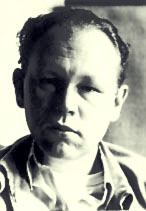 Jack Spicer (1925-1965) was an American poet and dramatist who was a key part of the San Francisco Renaissance.
Jack Spicer (1925-1965) was an American poet and dramatist who was a key part of the San Francisco Renaissance.
Spicer was born in Los Angeles and spent most of his writing life in San Francisco. He spent the years 1945 to 1955 at the University of California, Berkeley, where he began writing, doing work as a research linguist and publishing poetry and befriended other poets, including Robert Duncan and Robin Blaser. Spicer’s poetry of this period is collected in One Night Stand and Other Poems (1980). His Imaginary Elegies, later collected in Donald Allen’s The New American Poetry 1945-1960 anthology, were written around this time.
In 1954, he co-founded the famous Six Gallery, the scene of the famous October 1955 Six Gallery reading that launched the West Coast Beat movement. In 1955, Spicer moved to New York and then to Boston, where he worked for a time in the Rare Book Room of Boston Public Library. Blaser was also in Boston at this time, and the pair made contact with a number of local poets, including John Wieners.
He returned to San Francisco in 1956 and started working on After Lorca. This book represented a major change in direction for two reasons. Firstly, he came to the conclusion that stand-alone poems (which Spicer referred to as his one night stands) were unsatisfactory and that henceforth he would compose sequences, or books. In fact he wrote to Blaser that ‘all my stuff from the past (except the Elegies and Troilus) looks foul to me.’ Secondly, in writing After Lorca, he began to practise what he called “poetry as dictation”. His interest in the work of Federico Garcia Lorca, especially the canto jondo, also brought him near the poetics of the deep image group. The Troilus referred to was Spicer’s then unpublished play of that name. The play finally appeared in print in 2004 in issue 3 of No – A Journal of the Arts.
In 1957, Spicer ran a workshop called Poetry as Magic at San Francisco State College, which was attended by Duncan and others. He also participated in, and sometimes hosted, Blabbermouth Night at a literary bar called The Place. This was a kind of contest of improvised poetry and encouraged Spicer’s view of poetry as being dictated to the poet.
Spicer’s view of the role of language in the process of writing poetry was probably the result of his knowledge of modern pre-Chomskian linguistics and his experience as a research linguist at Berkeley. In the legendary Vancouver lectures he elucidated his ideas on “transmissions” (dictations) from the outside, using the comparison of the poet as crystal set or radio receiving transmissions from outer space, or Martian transmissions. Although seemingly farfetched, his view of language as “furniture”, through which the transmissions negotiate their way, is grounded in the structuralist linguistics of Zellig Harris and Hockett. (In fact, some of his poems directly refer to linguistic concepts such as morphemes.) No doubt he used the term Martian transmissions because his audience at the Vancouver lectures did not consist of linguists but of poets, and poets are better able to understand metaphoric thinking rather than the explanation of analytic concepts of modern linguistics.
Spicer died as a result of his alcoholism and his reputed last words were “My vocabulary did this to me.” His later poetry was published in The Collected Books of Jack Spicer (1995). As of 2004, a collected works is being prepared under the auspices of the Wesleyan University Press.

